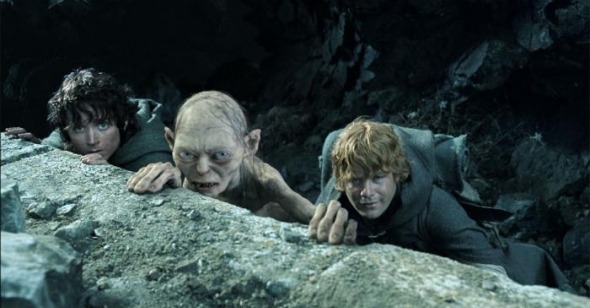The Scouring of the Saga
Suzanne Scott on The Lord of the Rings: The Return of the King
Let’s just get the sweeping accolades out of the way. Simply put (which is torturous, with subject matter this infinite in scope), Peter Jackson’s adaptation and visualization of J.R.R. Tolkien’s revered Lord of the Rings trilogy is nothing short of the finest feat of fantasy filmmaking in the past 50 years, and perhaps beyond. Period. Before I’m mercilessly accused of overstating my case or, worse yet, deluded fangirling, allow me to elaborate. Its vast technological and narratological achievements aside, the films have effectively, if inadvertently, addressed nearly every major complaint about contemporary Hollywood big-budget cinema.
First and foremost, Jackson’s series reaffirmed that bigger can, in fact, be better, and director’s cuts can, indeed, be more than mere bouts of auteur narcissism. The trilogy, in both its theatrical and “expanded” incarnations, has not only redefined the “epic,” but also fully realized the power of melding masterful adaptation with equally masterful execution. That Peter Jackson served as his own virtual cottage industry on the project (director, adapter, and all around digital majordomo in conjunction with WETA, his visual effects house) entitles him to his own pedestal in the filmmaking hall of fame, but that he has so selflessly reared his final cut privileges to address fan concerns and qualms is what has truly solidified his eminence amongst the booming home entertainment marketplace.
In a decade low on originality and heavy on adaptation (so much so that the Charlie Kaufmans of the world are now devoting full films to the process), Jackson summarily proved that walking the fine line between faithfulness and innovation can indeed be done. Short of adapting the Holy Bible, there isn’t a text in recent memory with more cultural cache than Tolkien’s trilogy. That Jackson saw the project through within the confines of the Hollywood studio system and managed to leave Tolkien’s social consciousness intact is nothing short of a miracle—for the first time in recent memory, when things explode and maimed corpses are flying about the screen, we feel it. The Lord of the Rings has, for all intents and purposes, resensitized a waning “you’ve seen one action sequence, you’ve seen them all” audience precisely because it forces the spectator to empathize, as Tolkien did, with each faceless soldier within the mass. While the term “ensemble” gets tossed around liberally, rarely has it seen such prominence, or contained such a diverse array of talent.
That the Lord of the Rings trilogy falls into the category of fantasy is at once ironic and fitting. Fitting, in that cinema has always been concerned with visually mapping the limitless confines of the imagination, and the fantasy genre serves as the ideal vehicle for this challenge: namely, to realize the unreal. Ironic, in that Jackson’s films have been heralded primarily for their realism and sense of authenticity. If nothing else, the trilogy will be long remembered as the cultural moment in which the full promise of CGI was fulfilled. Gollum, digitally enhanced by actor Andy Serkis’s actorly bite, silenced naysayers who argued that synthespians would never emote at the level of their flesh-and-blood counterparts. WETA unleashed organic armies of orcs and oliphaunts that brought new weight to the term “virtual reality.” And everyone, everywhere, finally stopped looking for the puppet strings and got lost in the spectacle of it all.
The Return of the King, as the culminating installment of the one trilogy to rule them all (sorry Georgie boy), is firmly entrenched in these aforementioned traits and yet, like the unholy bauble at its narrative core, takes completely unexpected paths to its destiny. Call it a case of purist prudishness, but The Return of the King, unlike its predecessors, is nothing if not shockingly unfaithful to Tolkien’s text. From the film’s Cain-vs-Abel opening flashback of Gollum’s first discovering of the ring (which undoubtedly sent countless fans scurrying back to the book’s appendix to see if they’d missed a few key pages) to its unsettlingly happy-go-lucky denouement (which Jackson had the Gandalfian foresight to begin apologizing for three years in advance), The Return of the King is as much a surprise to Tolkien addicts as it is to neophytes. And perhaps that’s the way it should be.
The trilogy has been, in a sense, an exercise in pushing the boundaries of the source text whilst simultaneously paying reverence to it, and what Jackson has focused on retaining in The Return of the King is the installment’s emotional breadth. Even in his early slash-and-hack zombie oeuvre, Jackson has always had an uncanny grasp on the sheer humanity, fine and foul, to be found in the horrific. The Battle of the Pelennor Fields, as with The Two Towers’ Battle of Helm’s Deep, is not only breathtaking in scale, but in sheer visceral impact. And then, in magnificent counterpoint, there are the intimate characterizations that refuse to fall into the shadows cast by the film’s action sequences. Frodo’s disintegration, Sam’s optimism, Gandalf’s resolve, Aragorn’s acceptance. In the end, that imprint on the audience’s communal psyche, each shared slack jaw or shed tear, is worth more than the sum of the film’s adaptive parts.
A filmic Frankenstein, The Return of the King is definitely not. Which isn’t to say that the devout members of Tolkien’s fandom fellowship don’t have bitching rights about said alterations (the lackluster integration of Faramir, Eowyn’s quickie grrlpower make-over, and Saruman’s disappearing act among them), or that our traditionally snobbish social standards that privilege literature over film are somehow unwarranted. But the fact remains that, much as Tolkien’s text is still a relevant literary artifact, the films will more likely than not usurp their place in popular culture. Just as Frodo discovers, once our eyes have been opened to the world outside our door, we can never truly go home again. Thanks to Peter Jackson, audiences will be visiting Middle Earth for generations to come.
